Services
- Training Making use of participatory techniques, TerraCircle provides training in planning and improvement for community food security …
- Project support We provide project feasibility studies, project planning and management including evaluation and documentation …
- Publications Develop training publication, organisation a communications and online media services …
- Sustainable livelihoods Developing livelihoods in villages increases the viability of the village as a place to live …
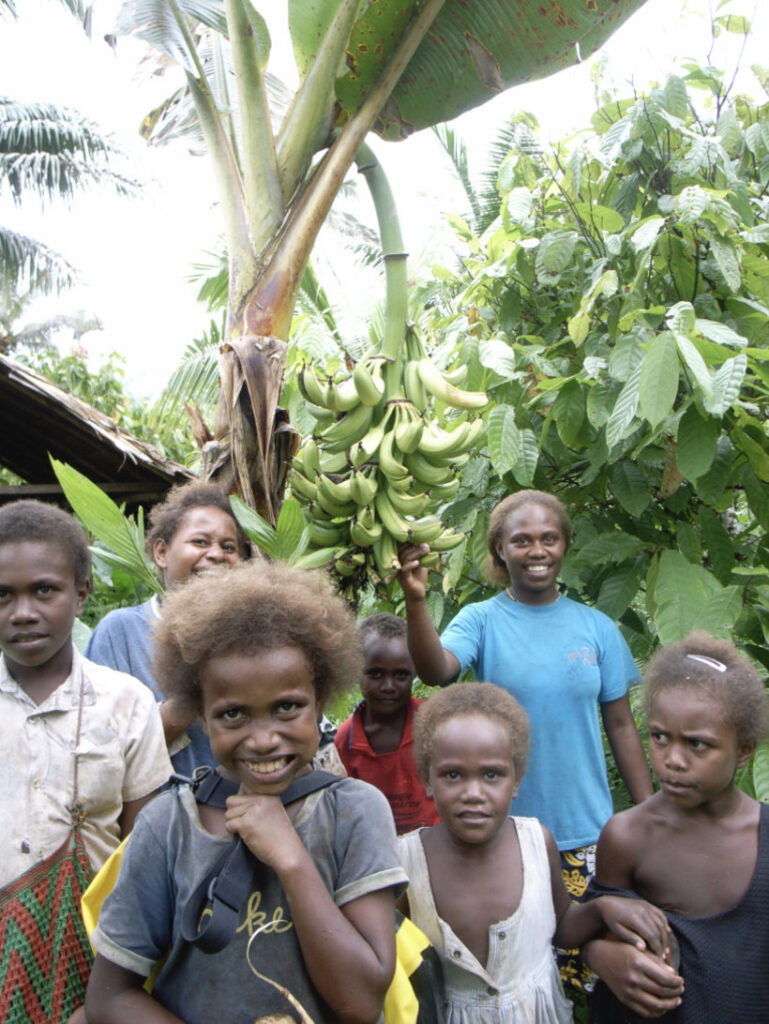
TerraCircle is a Melanesia specialist with…
…a team of experienced development practitioners providing:
- training in rural livelihoods, improved small scale farming to organisations and communities
- project management services
- media services for community self-development.
Our focus is on food security and the associated area of community health.
…we provide consultancy services to:
- non-government aid and development organisations
- humanitarian and emergency response agencies
- multilateral and regional bodies
- government organisations
- field staff of agricultural extension services
- groups and individuals in communities.
Our services
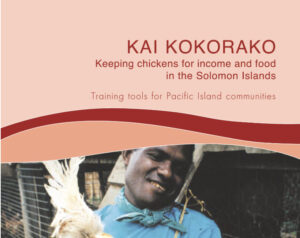 Developing livelihoods in villages increases the viability of the village as a place to live.
Developing livelihoods in villages increases the viability of the village as a place to live.
Producers of agricultural goods do not have to go to the towns in search of income. They can sell what they produce in town markets if these are in easy reach or sell through village markets. Such activity helps to maintain local economies.
Agriculture, the only viable economic activity
For many areas of the Pacific islands, especially the Solomon Islands, where populations are scattered across a large number of islands with poor transport links, agriculture remains the only viable rural livelihood. The challenge for development agencies is how to build economically and environmentally sustainable livelihoods based on the village.
For TerraCircle and the Kastom Gaden Association, the Sustainable Livelihoods for Rural Youth Project indicated that a little training could go a long way to improving the skills and products of those who rely on agricultural production for income.
A focus on the ‘youth bulge’
Livelihood projects bring an additional benefit when they are aimed at the 15 to 35-year age group. It is this ‘youth bulge’, the product of recent population growth, that feeds political instability when its needs are not met and feelings of hopelessness set in. There is evidence for this from developing countries around the world.
Assisting this demographic to develop livelihoods and earn income in their home village is a practical means of increasing a country’s internal security.
Our approach
Most village production is for the immediate consumption of families. This is subsistence production. Some farmers produce a small surplus that they sell or otherwise trade at village markets – what we call a semi-subsistence way of life.
The skills brought by TerraCircle trainers can be used to enhance both of these ways of life. They can also can be used to set up livelihoods in the form of small businesses.
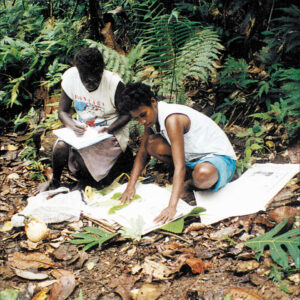
TerraCircle provides writing and editing services, online content and publication design and layout to organisations in Australia and overseas.
Publications for Pacific Island communities
Despite living in a world awash with information, it remains difficult for community development and agricultural trainers in the South Pacific to find pertinent, concise and useable information to assist them in their work.
Much good work by non-government aid organisations as well as the government goes undocumented and is lost to development workers and trainers.
That is why TerraCircle publishes training material as part of its development work. We know that producing manuals and other material in print and online formats make it available to others and help build a practitioner’s knowledge base of use to the wider development aid community.
Training tools for Pacific Island communities
TerraCircle produces:
- reports for donor agencies and reports on the activities of partner organisations
- teaching manuals under the Training Tools for Pacific Island Communities series for use by South Pacific trainers consisting of lesson plans, teaching notes, flip chart illustrations for photocopying and instructional material designed to be adapted and put to use by development professionals, agricultural extension staff and others involved in the development of communities
- handbooks, lined to the trainer’s manuals, for trainees.
The publications are based on actual techniques trialled and developed in the field by the Kastom Gaden Association, Solomon Islands Planting Material Network and TerraCircle.
As well as manuals, TerraCircle produces other publications of interest to development professionals.
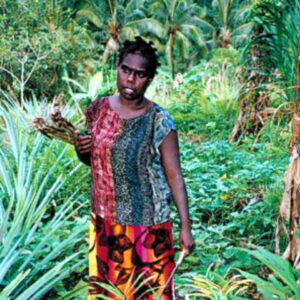 TerraCircle’s primary focus is community food security and nutritional health.
TerraCircle’s primary focus is community food security and nutritional health.
We provide:
- community food security assessment
- training in small-scale agriculture for improved subsistence gardening and small-scale cash cropping
- training in community seed saving, the establishment of seed banks and regional seed exchange networks
- training and assistance in the restoration of village food and seed production/ distribution systems following a disruption.
We define community food security as access to a diverse, year-round supply of nutritional foods.
The food security of a community is enhanced when most of its food supply is produced locally.
TerraCircle’s approach to food security encompasses:
- farming systems that are affordable, and sustainable within the limitations imposed by local resource availability and that combine the best of traditional farming and modern knowledge
- farmer involvement in the production, processing and distribution of planting material, such as seed
- the maintenance of fertility in farmland soils and the rehabilitation of degraded soils
- the sustainability of non-farming sources of food, such as fishing
- food production for sale at local markets
- the availability of foods at village markets and trade stores.
Food – the basis of future development
For cash-poor communities, a secure food supply is the basis of all future community development.
A locally-produced, reliable, nutritionally balanced supply of food supports the nutritional health of a community. Without good health, individuals are unlikely to be able to contribute much to the development of their village or people.
Securing the food supply against disruption
In many parts of the world, the last decade has been one of political and social disruption. For many people, the world is an increasingly insecure place.
In these circumstances, the challenge for communities is to maintain their cohesion in the face of disruption. The security of the food supply is of prime importance and is boosted where local or regional seed banks and exchange networks exist (eg Planting Material Network). The local production of staple foods:
- reduces vulnerability to natural and civil disturbance or military conflict
- assists rural communities cope with a sudden influx of refugees
- reduce the impact of disruption to medical services where productive home gardens and local markets support a nutritionally mixed diet and a high standard of personal health.
PHOTO: Agnes, a community-based agricultural trainer on Bougainville, in her bush garden. The productivity and diversity of bush gardens are critical to the nutritional health of Melanesians who continue to follow a village-based lifestyle.
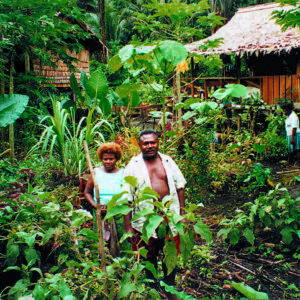 It is difficult to engage in development and self-help activities without a high standard of community health.
It is difficult to engage in development and self-help activities without a high standard of community health.
Community health is based on the:
- health of individuals
- health of families
- access to health services
- access to information about healthy living
- access to a diverse diet
- access to training in diversified farming and semi-subsistence gardening.
In the South Pacific and other developing countries where families continue to rely on the productivity of their subsistence gardens and purchases at local markets, a nutritionally balanced diet can be attained if a suitable mix of crops is grown. In turn, crop production depends on the maintenance of fertile soils.
This is why TerraCircle focuses on improving the productivity and crop diversity of home and bush gardens as well as small-scale cash cropping.
Most education in community health stops at the blackboard with exhortations to eat a mixed diet. But TerraCircle trainers take it further by training participants in improved methods of producing a mixed diet in their own gardens. With only a little training, participants can produce a diverse diet for themselves.
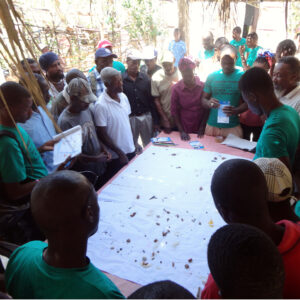 TerraCircle trainers use a number of proven approaches to development that:
TerraCircle trainers use a number of proven approaches to development that:
- foster self-help
- involve the community in making decisions, assessing trials and putting development strategies into action.
Participatory Rural Appraisal – PRA
PRA offers a selection of techniques that encourage the participation of community members, clans and families in their own development.
PRA creates a sense of ownership of a project through direct involvement in:
- project planning and implementation
- information identification and assessment
- project monitoring and evaluation
- decision making.
Participatory Technology Development – PTD
PTD involves village farmers in the trialing and assessment of new techniques and technologies.
Used by innovative development agencies worldwide, PTD includes:
- the training of farmers in new approaches
- the trialing of new ideas
- farmer trials and their participatory assessment
- decision-making by farmers as to whether or not they want to adopt new ideas; the decision is based on their experience during field trials.
Community Food Security Assessment
Community food security assessment is a participatory approach to assessing the capability of a community to continue to provide its own food needs.
Trained and assisted by TerraCircle field operatives, community members survey:
- the condition of their agricultural soils
- their supply of planting materials such as seeds
- access to land
- their knowledge and information needs
- their degree of reliance on food from outside sources
- global, regional and local influences affecting food security
- the trend in food security
- other pertinent factors.
Using this information, a program of training and agricultural improvement is developed.
Low External Input Sustainable Agriculture – LEISA
The experience of TerraCircle trainers has led to the adoption of the LEISA approach to small-scale agricultural development.
LEISA encourages:
- increased regional and local self-reliance in food production
- the encouragement of local innovation in the production of farming inputs
- the development of local and regional economies
- reduced reliance on imported agricultural inputs
- reduced need for poor farmers to raise cash or credit to purchase farming inputs, freeing money for other uses
- sale of surplus farm production
- increased food security in case of natural disaster or conflict.
LEISA is an approach under constant improvement. It is adaptable to regional and local circumstances and is used worldwide by development professionals.
Text coming soon.
